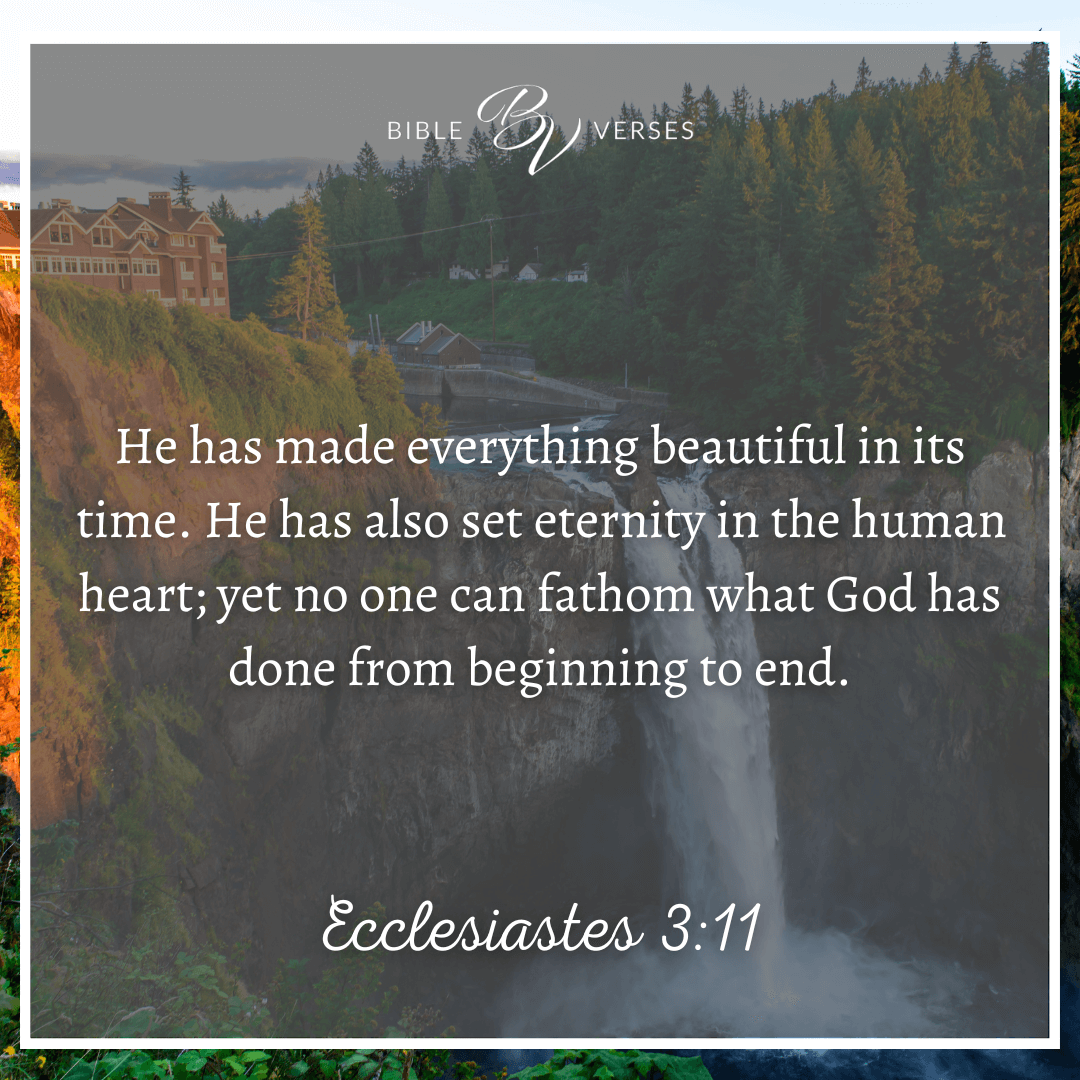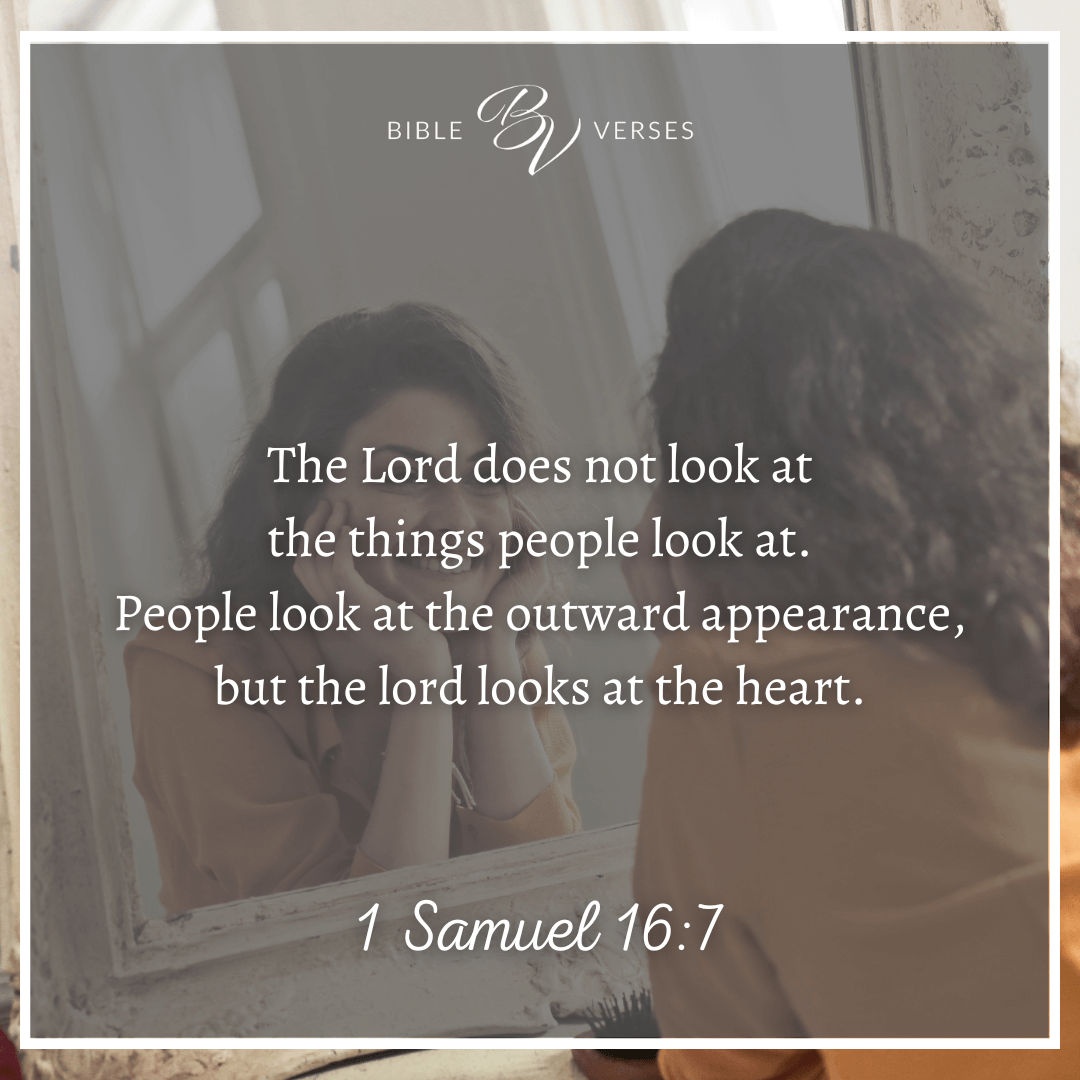Radiate His Glory: 15 Bible Verses About Beauty
In a world often fixated on external appearances and fleeting trends, the Bible offers a profound perspective on beauty that transcends superficiality. The Scriptures provide a rich tapestry of insights into what constitutes true beauty, shifting the focus from mere physical attributes to the inner qualities that reflect God’s handiwork.
From the enduring value of wisdom to the radiant transformation of the heart, biblical verses offer a deeper understanding of beauty rooted in spiritual and moral virtues. In this blog post, we will explore key Bible verses that illuminate the true essence of beauty, encouraging a reflection on how our lives can mirror His radiance.
Beauty Quotes
Beauty in the Bible
Genesis 1:27
So God created man in his own image, in the image of God created he him; male and female created he them.
So God created mankind in his own image,
in the image of God he created them;
male and female he created them.
So God created human beings in his own image. In the image of God he created them; male and female he created them.
So God created man in his own image, in the image of God he created him; male and female he created them.
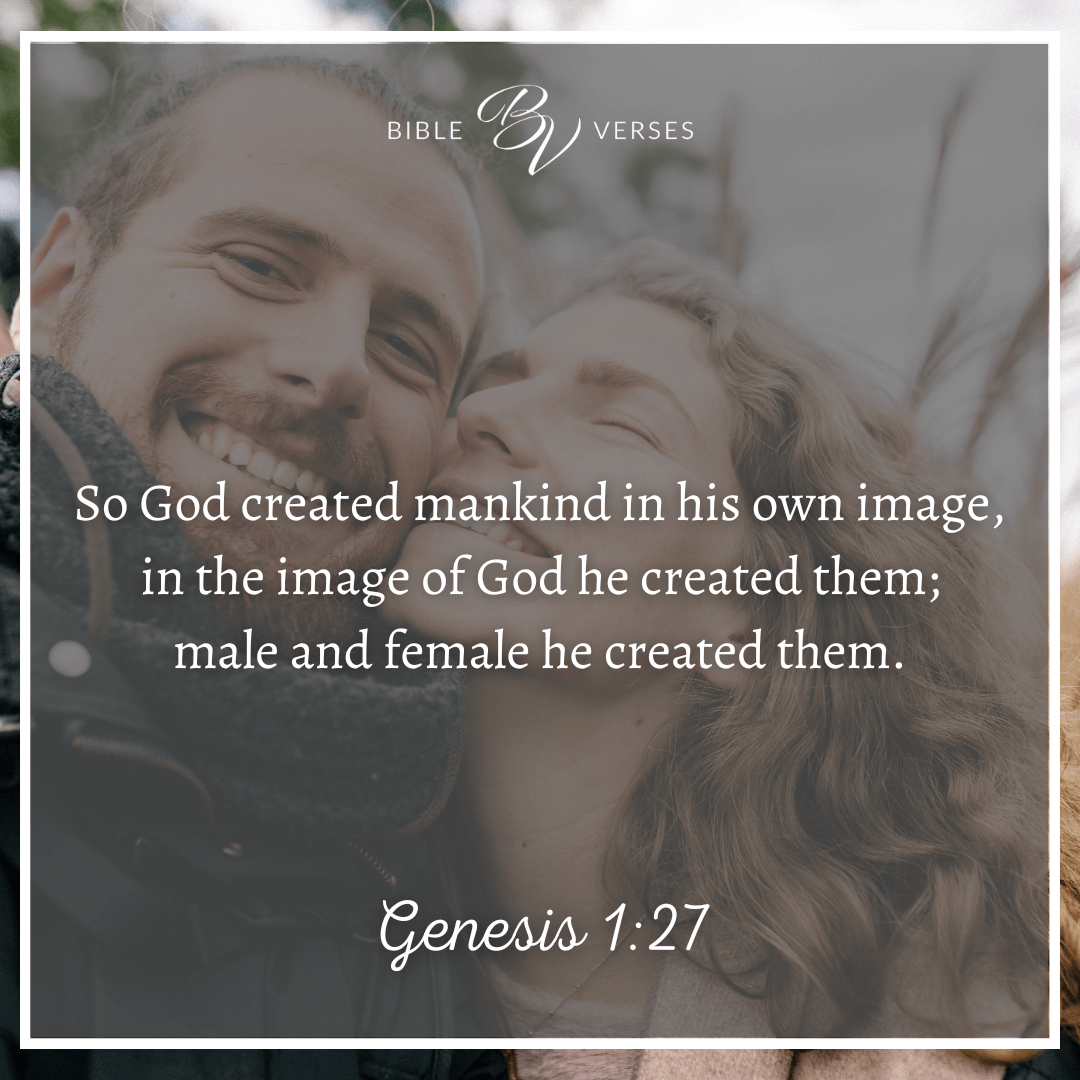
This verse is significant as it conveys the idea that humans are created in the image of God, imbuing them with inherent dignity and worth.
In terms of beauty, this passage reveals that true beauty is rooted in our intrinsic value as beings made in the image of God. Beauty is not solely about outward appearance but also about the reflection of God’s nature within us. This divine image encompasses qualities such as love, kindness, creativity, and morality, which contribute to a deeper, spiritual beauty.
Furthermore, the creation of both male and female highlights the diversity and complementary nature of human expression, showing that beauty is found in the variety of forms and characteristics that reflect God’s image.
This understanding encourages us to see beauty in ourselves and others, recognizing it as a reflection of the divine nature and the intentionality behind our creation.
1 Samuel 16:7
But the LORD said unto Samuel, Look not on his countenance, or on the height of his stature; because I have refused him: for the LORD seeth not as man seeth; for man looketh on the outward appearance, but the LORD looketh on the heart.
But the LORD said to Samuel, “Do not consider his appearance or his height, for I have rejected him. The LORD does not look at the things people look at. People look at the outward appearance, but the LORD looks at the heart.”
But the LORD said to Samuel, “Don’t judge by his appearance or height, for I have rejected him. The LORD doesn’t see things the way you see them. People judge by outward appearance, but the LORD looks at the heart.”
But the LORD said to Samuel, “Do not look on his appearance or on the height of his stature, because I have rejected him. For the LORD sees not as man sees: man looks on the outward appearance, but the LORD looks on the heart.”
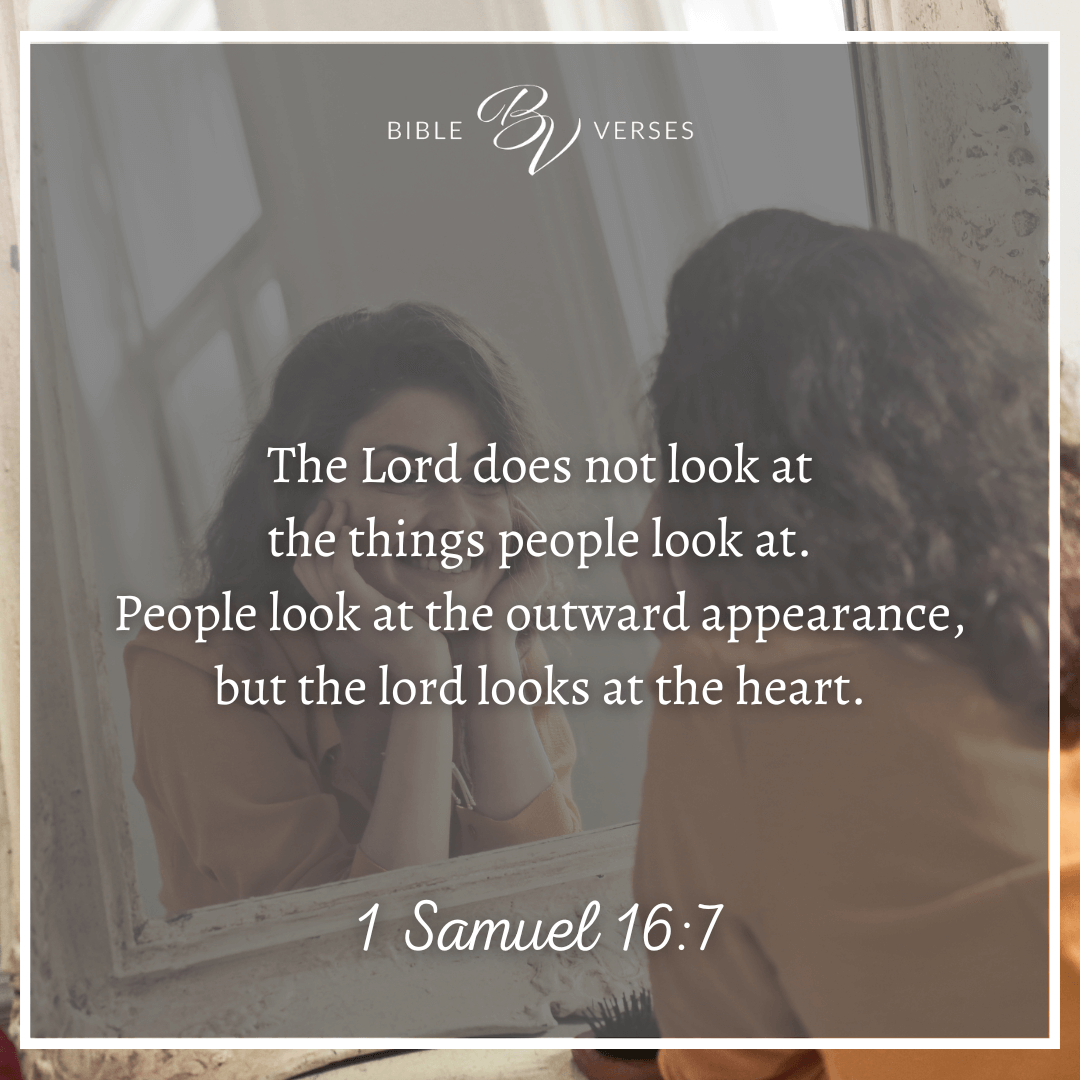
This verse is set in the context of God instructing the prophet Samuel to anoint the next king of Israel. Samuel is initially impressed by the physical appearance of Eliab, one of Jesse’s sons, but God reminds Samuel that divine selection is based on inner qualities rather than outward appearance.
In relation to beauty, this verse emphasizes that true beauty, in God’s eyes, lies within a person’s character and heart rather than their physical appearance. It teaches that external attributes, which often dominate human standards of beauty, are not what matter most to God.
Instead, God values the inner virtues, intentions, and the moral and spiritual quality of an individual. This perspective encourages a deeper understanding of beauty, one that prioritizes inner qualities such as integrity, kindness, and faithfulness over mere physical attractiveness.
Psalm 27:4
One thing have I desired of the LORD, that will I seek after; that I may dwell in the house of the LORD all the days of my life, to behold the beauty of the LORD, and to inquire in his temple.
One thing I ask from the LORD, this only do I seek: that I may dwell in the house of the LORD all the days of my life, to gaze on the beauty of the LORD and to seek him in his temple.
The one thing I ask of the LORD— the thing I seek most— is to live in the house of the LORD all the days of my life, delighting in the LORD’s perfections and meditating in his Temple.
One thing have I asked of the LORD, that will I seek after: that I may dwell in the house of the LORD all the days of my life, to gaze upon the beauty of the LORD and to inquire in his temple.
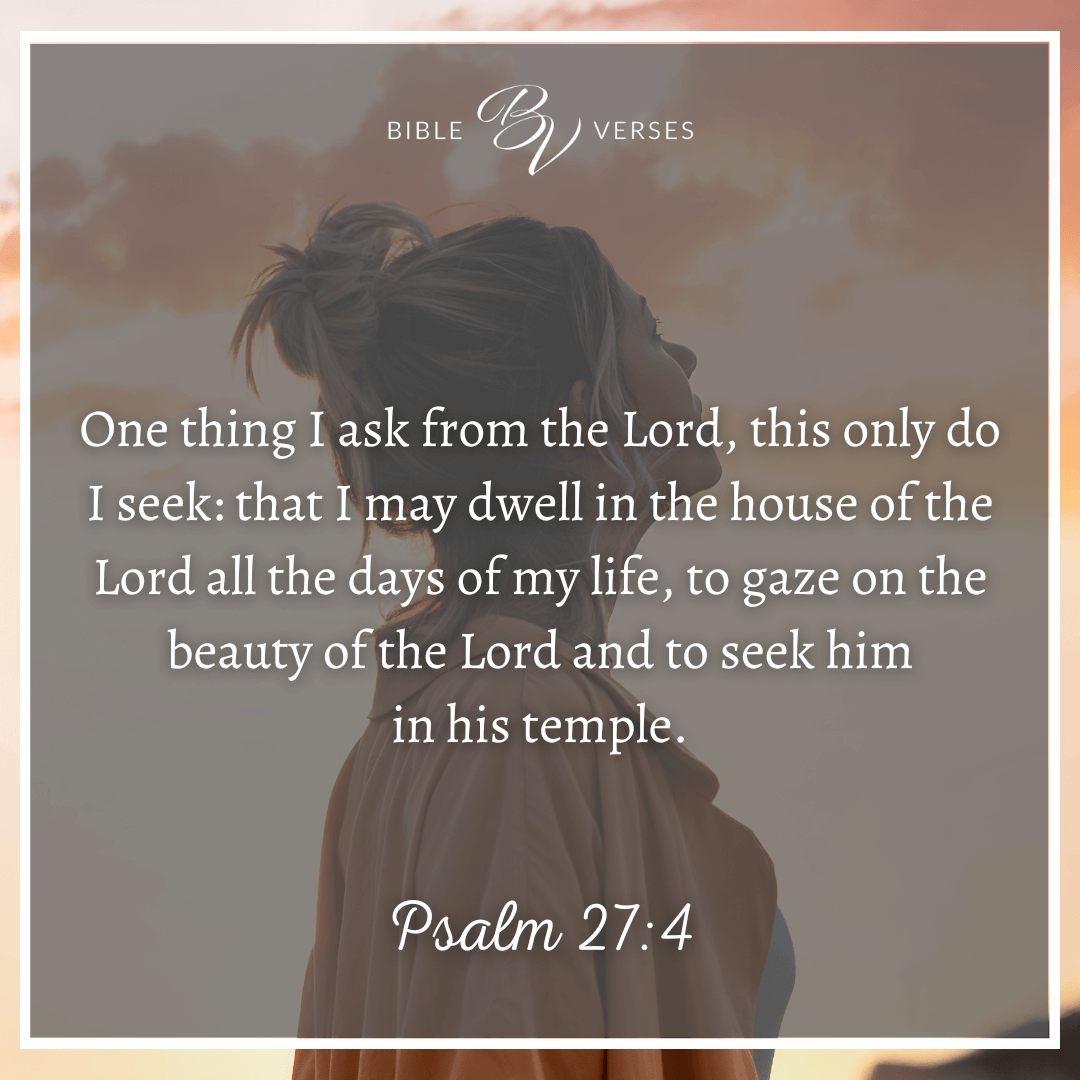
This verse reflects King David’s deep desire to be in the presence of God and to experience His divine beauty. David’s longing to “gaze on the beauty of the Lord” indicates a profound spiritual admiration for God’s glory and splendor.
The ultimate source of beauty is God Himself. Experiencing and appreciating God’s beauty leads to a deeper and more fulfilling understanding of what beauty truly is. This perspective shifts the focus from worldly and superficial notions of beauty to a spiritual appreciation for God, emphasizing that the greatest beauty is found in His character, His works, and His presence.
Psalm 34:5
They looked unto him, and were lightened: and their faces were not ashamed.
Those who look to him are radiant; their faces are never covered with shame.
Those who look to him for help will be radiant with joy; no shadow of shame will darken their faces.
Those who look to him are radiant, and their faces shall never be ashamed.
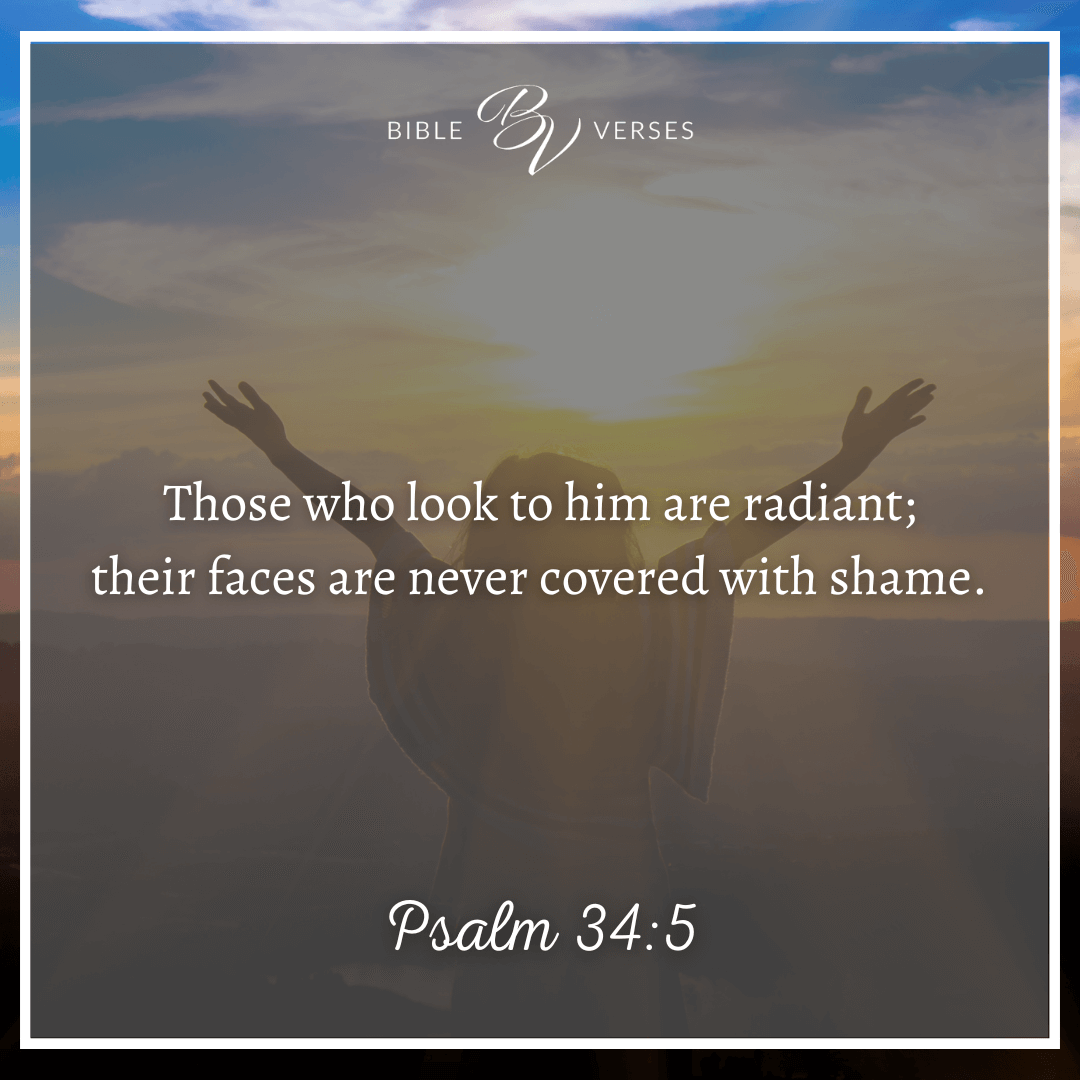
Psalm 34:5 speaks to the transformative effect of looking to God with faith and trust. When people turn their gaze towards God, they become radiant, reflecting His glory and goodness. This radiance signifies an inner joy, peace, and confidence that comes from being in a relationship with God.
Psalm 139:13-16
For thou hast possessed my reins: Thou hast covered me in my mother’s womb.
I will praise thee; for I am fearfully and wonderfully made: Marvellous are thy works; And that my soul knoweth right well.
My substance was not hid from thee, When I was made in secret, And curiously wrought in the lowest parts of the earth.
Thine eyes did see my substance, yet being unperfect; And in thy book all my members were written, Which in continuance were fashioned, when as yet there was none of them.
For you created my inmost being;
you knit me together in my mother’s womb.
I praise you because I am fearfully and wonderfully made;
your works are wonderful,
I know that full well.
My frame was not hidden from you
when I was made in the secret place,
when I was woven together in the depths of the earth.
Your eyes saw my unformed body;
all the days ordained for me were written in your book
before one of them came to be.
You made all the delicate, inner parts of my body and knit me together in my mother’s womb. Thank you for making me so wonderfully complex!
Your workmanship is marvelous—how well I know it. You watched me as I was being formed in utter seclusion, as I was woven together in the dark of the womb. You saw me before I was born.
Every day of my life was recorded in your book. Every moment was laid out before a single day had passed.
For you formed my inward parts; you knitted me together in my mother’s womb.
I praise you, for I am fearfully and wonderfully made. Wonderful are your works; my soul knows it very well.
My frame was not hidden from you, when I was being made in secret, intricately woven in the depths of the earth.
Your eyes saw my unformed substance; in your book were written, every one of them, the days that were formed for me, when as yet there was none of them.
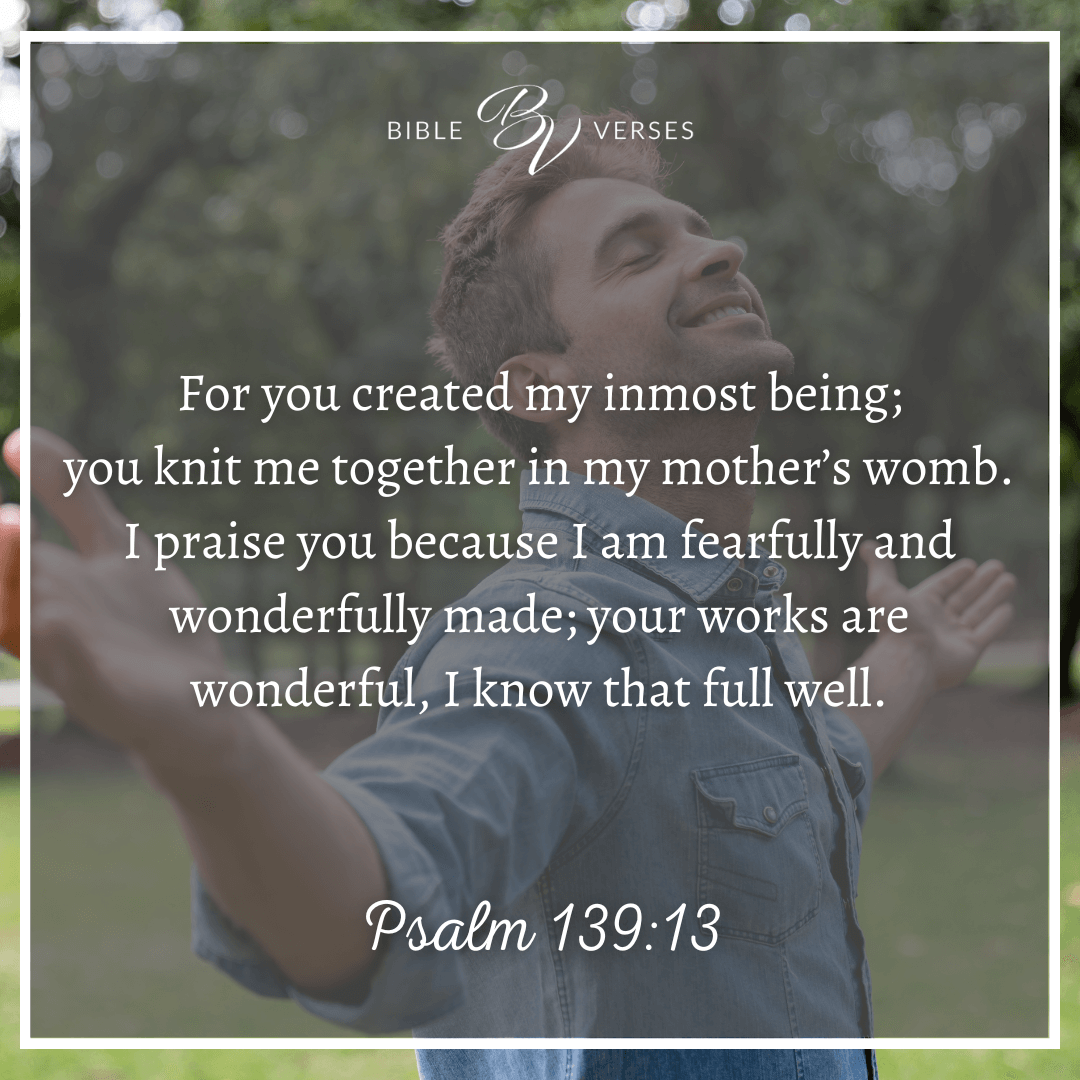
These verses highlight the intimate and intentional act of God in creating each person. They express awe and gratitude for the meticulous and loving way in which God forms each individual, emphasizing that every person is crafted with purpose and care.
True beauty is rooted in the recognition that each person is “fearfully and wonderfully made” by God. This divine craftsmanship bestows inherent worth and dignity on every individual. The beauty described here is not based on societal standards or physical appearance, but on the profound truth that each person is a unique and intentional creation of God.
Proverbs 3:15
She is more precious than rubies: and all the things thou canst desire are not to be compared unto her.
She is more precious than rubies; nothing you desire can compare with her.
Wisdom is more precious than rubies; nothing you desire can compare with her.
She is more precious than jewels, and nothing you desire can compare with her.

Proverbs 3:15 highlights the immense value and incomparable worth of wisdom, personifying it as a woman who is more precious than the finest jewels. It underscores that wisdom is of greater value than any material possession or desire.
In relation to beauty, this verse suggests that true beauty lies in wisdom. It implies that the qualities associated with wisdom—such as understanding, insight, and discernment—are more beautiful and desirable than physical appearance or worldly riches.
Proverbs 27:19
As in water face answereth to face, So the heart of man to man.
As water reflects the face, so one’s life reflects the heart.
As a face is reflected in water, so the heart reflects the real person.
As in water face reflects face, so the heart of man reflects the man.
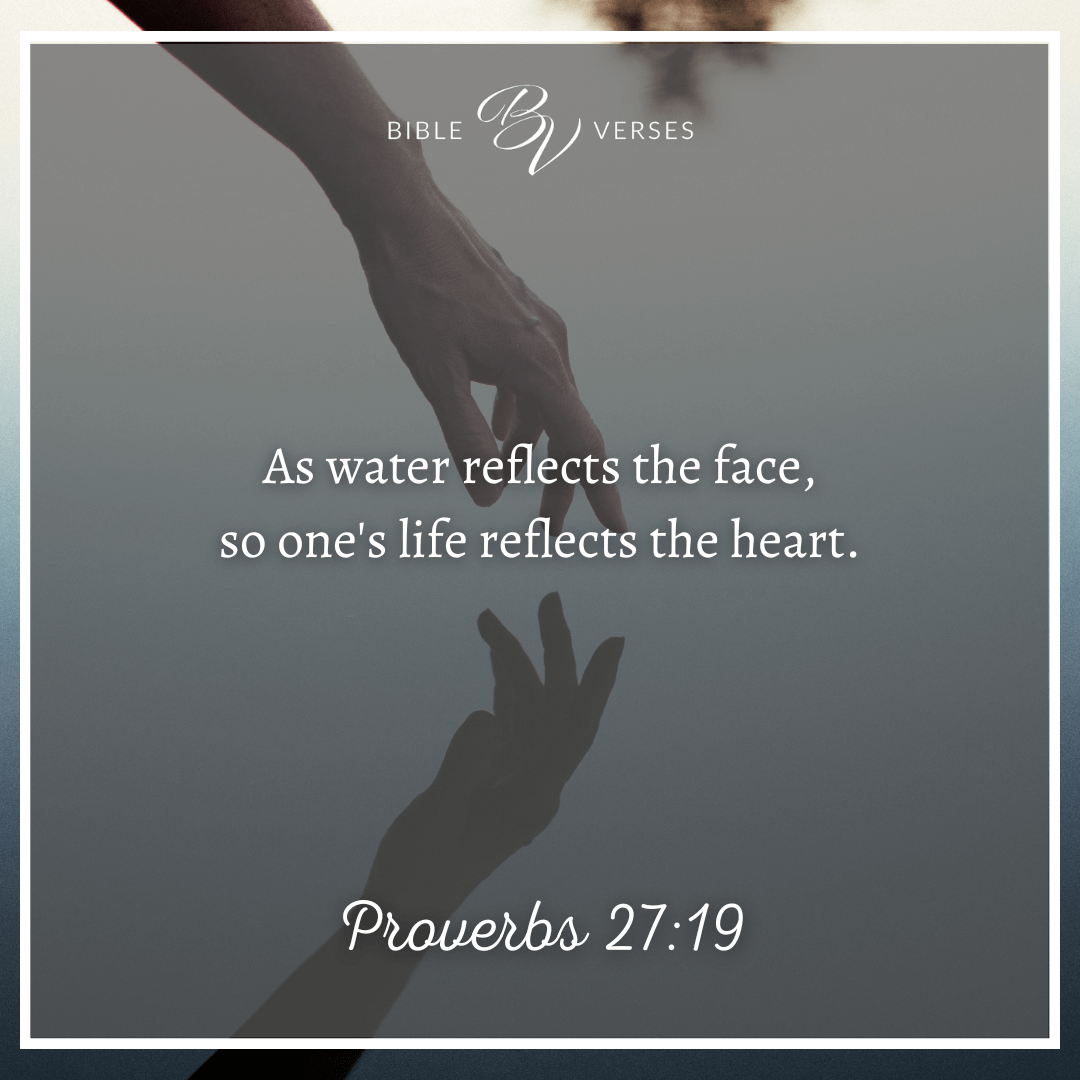
This verse draws a parallel between the way water reflects a person’s face and how one’s life reflects their inner heart and character. It suggests that just as a person’s reflection in water reveals their physical appearance, a person’s actions and life reveal their true inner self.
Proverbs 27:19 emphasizes that true beauty is a reflection of the heart. It implies that the genuine qualities of a person’s character are what truly define and reflect their beauty.
Proverbs 31:30
Favour is deceitful, and beauty is vain: But a woman that feareth the LORD, she shall be praised.
Charm is deceptive, and beauty is fleeting; but a woman who fears the LORD is to be praised.
Charm is deceptive, and beauty does not last; but a woman who fears the LORD will be greatly praised.
Charm is deceitful, and beauty is vain, but a woman who fears the LORD is to be praised.

This bible verse about beauty is part of a larger passage that describes the qualities of a virtuous woman. It emphasizes that external charm and physical beauty are temporary and can be misleading, whereas the true and lasting value lies in a woman’s reverence for God.
In this context, the verse highlights the truth that a woman who lives in awe and respect of the Lord possesses a kind of beauty and worth that surpasses superficial attributes.
Ecclesiastes 3:11
He hath made every thing beautiful in his time: also he hath set the world in their heart, so that no man can find out the work that God maketh from.
He has made everything beautiful in its time. He has also set eternity in the human heart; yet no one can fathom what God has done from beginning to end.
Yet God has made everything beautiful for its own time. He has planted eternity in the human heart, but even so, people cannot see the whole scope of.
He has made everything beautiful in its time. Also, he has put eternity into man’s heart, yet so that he cannot find out what God has done from.
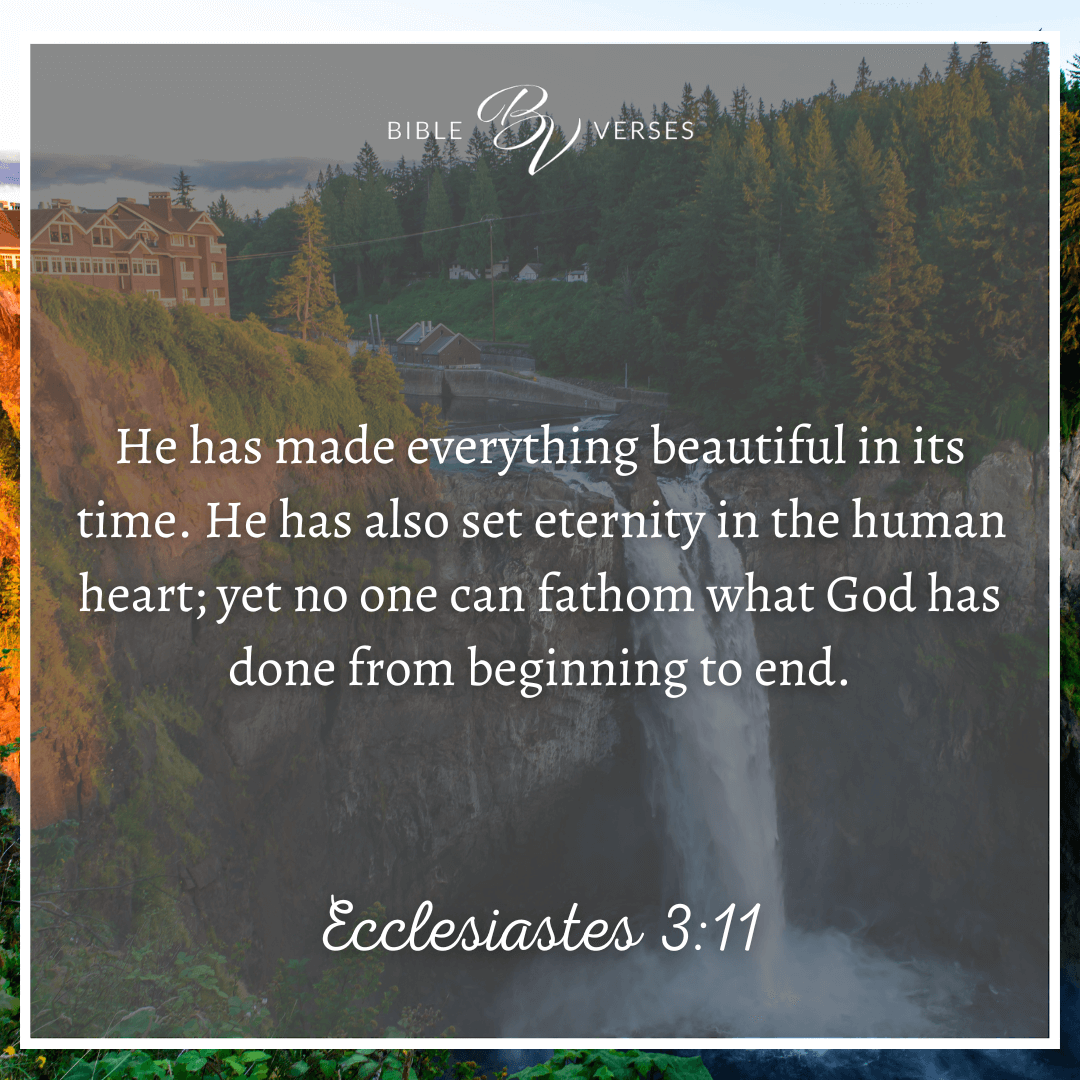
This verse reflects on the nature of God’s creation and His timing. Everything God has made is beautiful in its appointed time, and there is intentional order and purpose in the world. Additionally, this scripture acknowledges that humans have an innate sense of eternity and an understanding that there is more to life than what is immediately visible or comprehensible.
Ecclesiastes 3:11 invites a view of beauty that encompasses both the temporal and eternal aspects of existence, reflecting the depth and complexity of God’s work.
Isaiah 40:8
The grass withereth, the flower fadeth: but the word of our God shall stand for ever.
The grass withers and the flowers fall, but the word of our God endures forever.
The grass withers and the flowers fade, but the word of our God stands forever.
The grass withers, the flower fades, but the word of our God will stand forever.
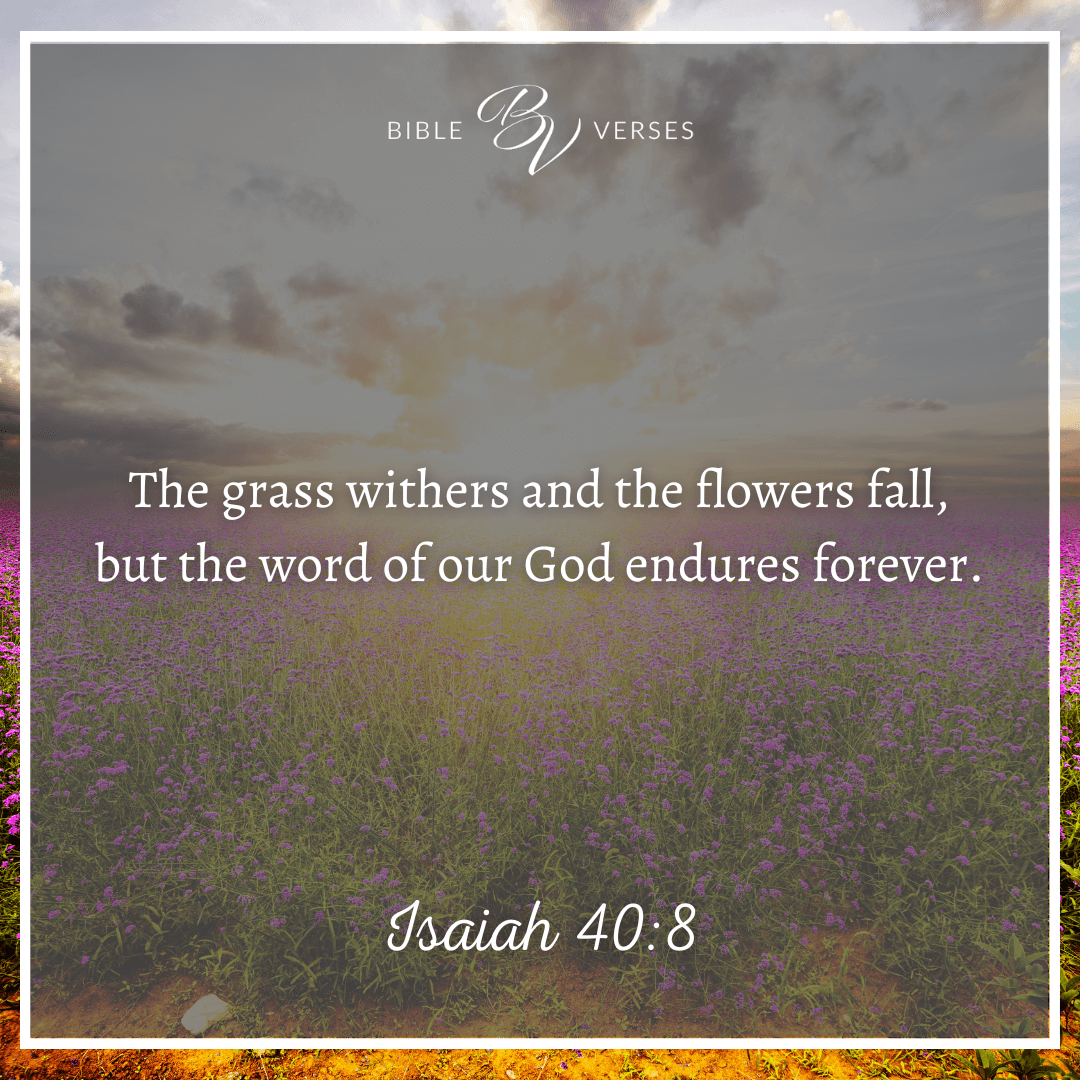
This verse contrasts the fleeting nature of natural beauty—represented by the grass and flowers—with the eternal and unchanging nature of God’s word. It highlights the temporary and impermanent qualities of physical beauty compared to the enduring truth and stability of God’s promises and commands.
Isaiah 62:3
Thou shalt also be a crown of glory in the hand of the LORD, and a royal diadem in the hand of thy God.
You will be a crown of splendor in the Lord’s hand, a royal diadem in the hand of your God.
The LORD will hold you in his hand for all to see— a splendid crown in the hand of God.
You shall be a crown of beauty in the hand of the LORD, and a royal diadem in the hand of your God.
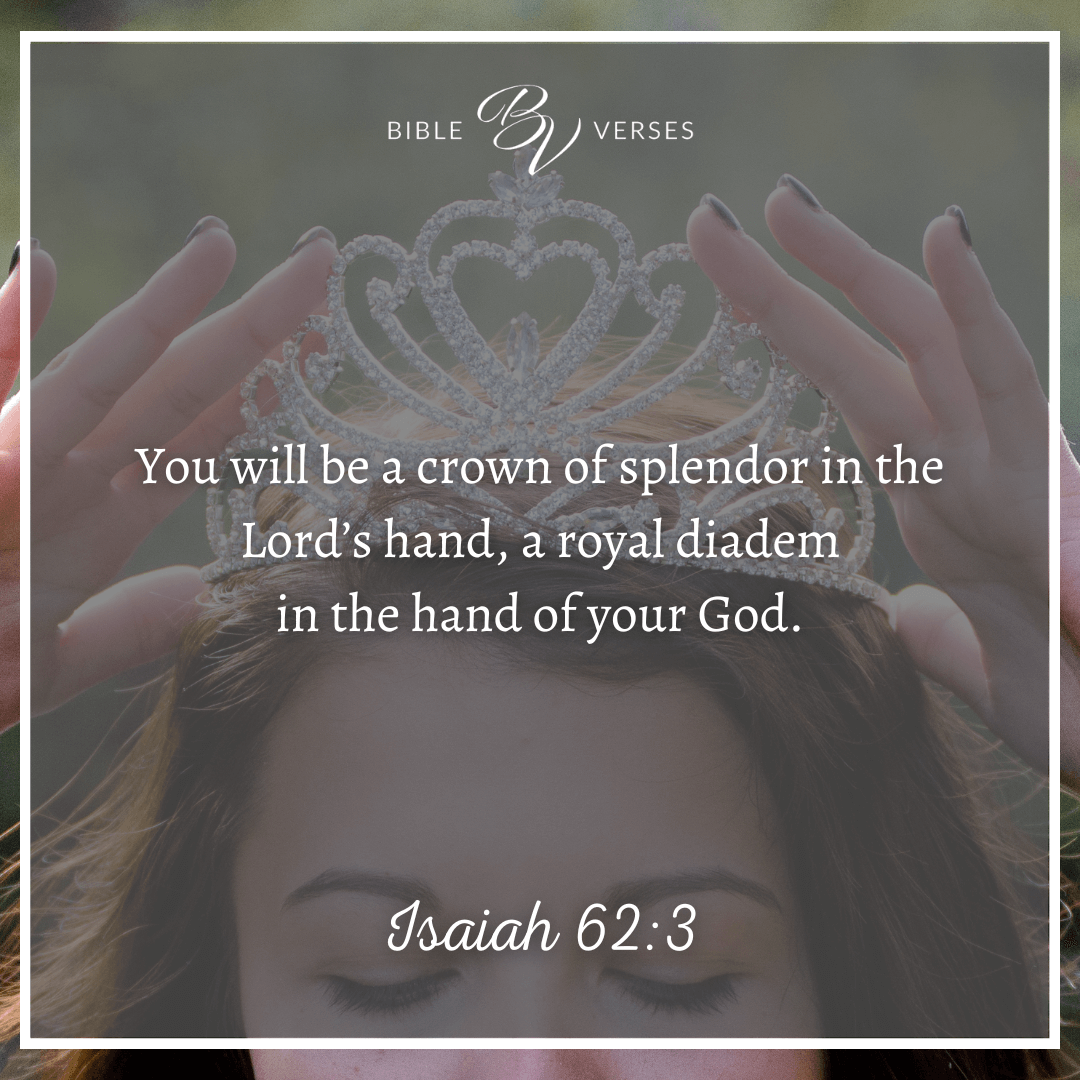
This verse uses the imagery of a crown and a royal diadem to describe the exalted status and honor that God bestows upon His people. It signifies a transformation into something precious and beautiful in the sight of God, reflecting His favor and grace.
In relation to beauty, this verse highlights a kind of beauty that is associated with divine approval and honor. The metaphor of a crown represents a regal and splendid beauty that comes from being in a special relationship with God, indicating that such spiritual and relational beauty is valued above mere physical attributes.
Matthew 6:25
Therefore I say unto you, Take no thought for your life, what ye shall eat, or what ye shall drink; nor yet for your body, what ye shall put on.
Therefore I tell you, do not worry about your life, what you will eat or drink; or about your body, what you will wear. Is not life more than food, and the body more than clothes?
That is why I tell you not to worry about everyday life—whether you have enough food and drink, or enough clothes to wear. Isn’t life more than food, and your body more than clothing?
Therefore I tell you, do not be anxious about your life, what you will eat or what you will drink, nor about your body, what you will put on. Is not life more than food, and the body more than clothing?
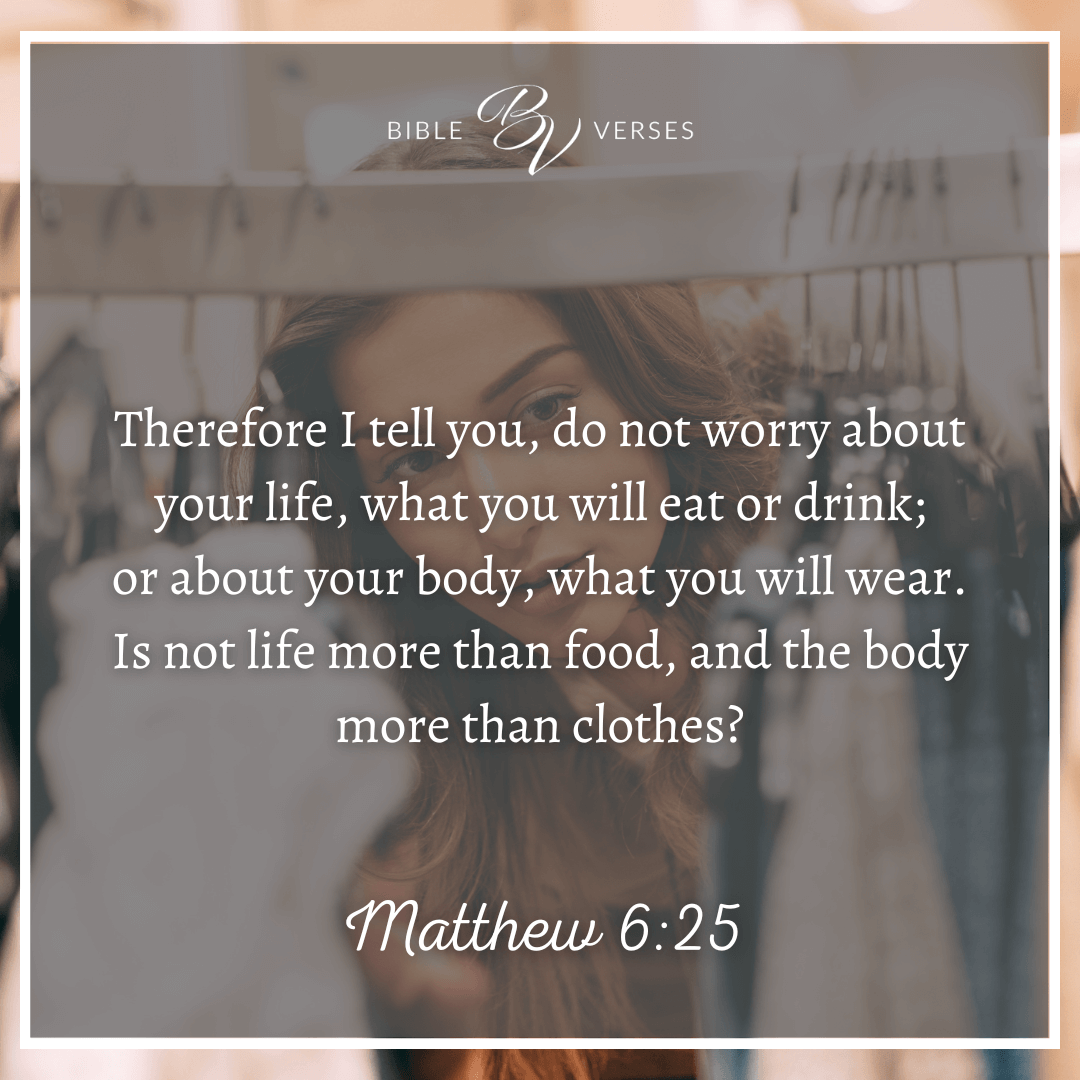
This verse is part of Jesus’ teaching on not being anxious about material needs and appearances. It encourages people to shift their focus from concerns about daily necessities and physical appearance to a deeper trust in God’s provision and care.
This verse echoes that true beauty is not found in material things like clothing or outward appearance, but in living a life of trust and faith.
2 Corinthians 4:16
For which cause we faint not; but though our outward man perish, yet the inward man is renewed day by day.
Therefore we do not lose heart. Though outwardly we are wasting away, yet inwardly we are being renewed day by day.
That is why we never give up. Though our bodies are dying, our spirits are being renewed every day.
Therefore we do not lose heart. Though outwardly we are wasting away, yet inwardly we are being renewed day by day.
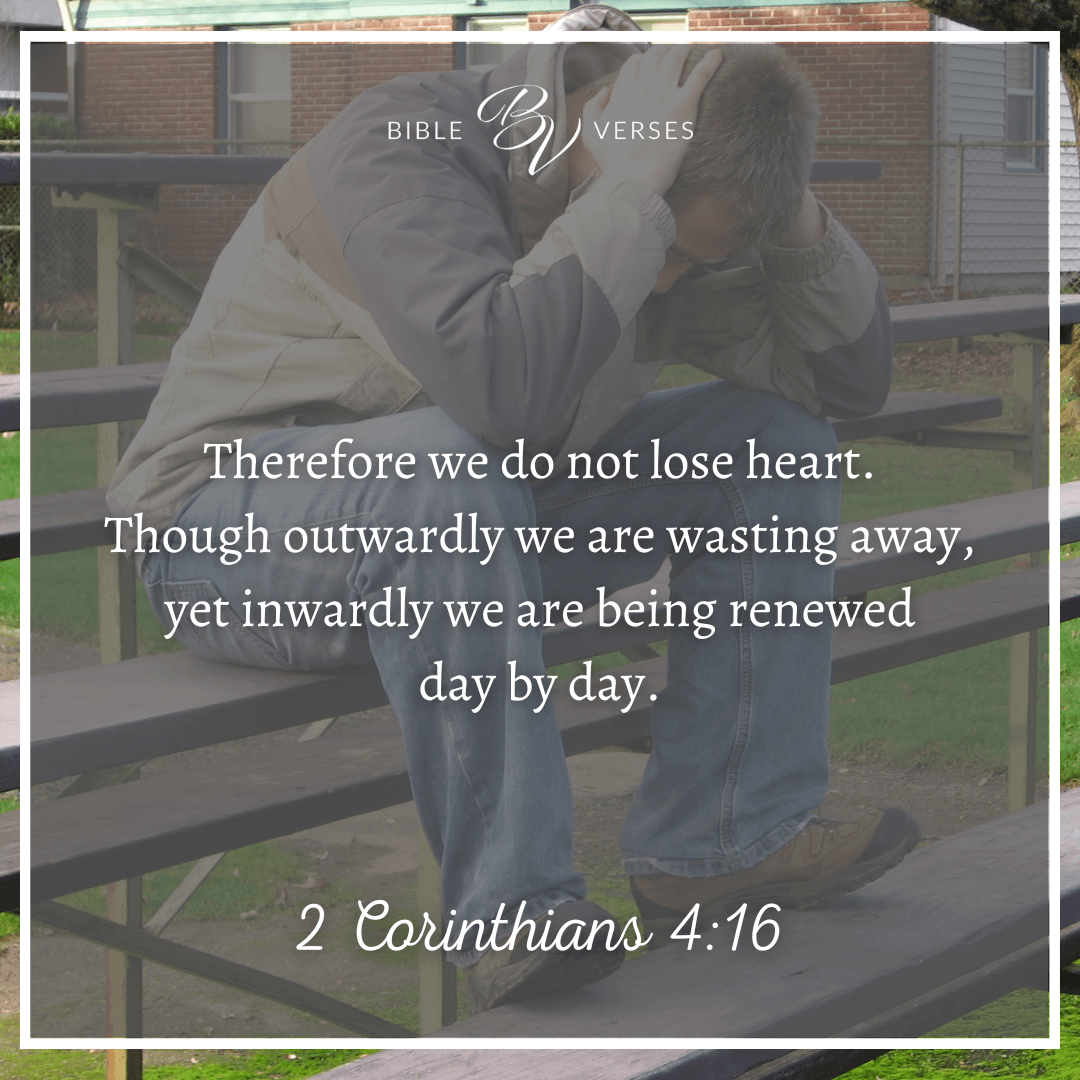
2 Corinthians 4:16 contrasts the physical decline of the body with the ongoing renewal of the inner self. Paul is addressing the believers’ struggles and hardships, reassuring them that despite the deterioration of their physical condition, their inner spiritual lives are being revitalized through their faith.
Ephesians 2:10
For we are his workmanship, created in Christ Jesus unto good works, which God hath before ordained that we should walk in them.
For we are his workmanship, having been created in Christ Jesus for good works, which God has before prepared that we should walk in them.
For we are God’s masterpiece. He has created us anew in Christ Jesus, so we can do the good things he planned for us long ago.
For we are his workmanship, created in Christ Jesus for good works, which God prepared beforehand, that we should walk in them.

This verse highlights the truth that people are uniquely crafted by God with a purpose. It emphasizes that individuals are not only created by God but are designed for a specific purpose and equipped to perform good works.
True beauty is found in recognizing oneself as God’s creation, made with intention and purpose. The beauty of a person’s life is seen in how they fulfill their God-given purpose and engage in good works.
1 Peter 3:3-4
Whose adorning let it not be that outward adorning of plaiting the hair, and of wearing of gold, or of putting on of apparel; but let it be the hidden man of the heart, in that which is not corruptible, even the ornament of a meek and quiet spirit, which is in the sight of God of great price.
Your beauty should not come from outward adornment, such as elaborate hairstyles and the wearing of gold jewelry or fine clothes. Rather, it should be that of your inner self, the unfading beauty of a gentle and quiet spirit, which is of great worth in God’s sight.
Don’t be concerned about the outward beauty of fancy hairstyles, expensive jewelry, or beautiful clothes. You should clothe yourselves instead with the beauty that comes from within, the unfading beauty of a gentle and quiet spirit, which is so precious to God.
Do not let your adorning be external—the braiding of hair and the putting on of gold jewelry, or the clothing you wear— but let your adorning be the hidden person of the heart with the imperishable beauty of a gentle and quiet spirit, which in God’s sight is very precious.
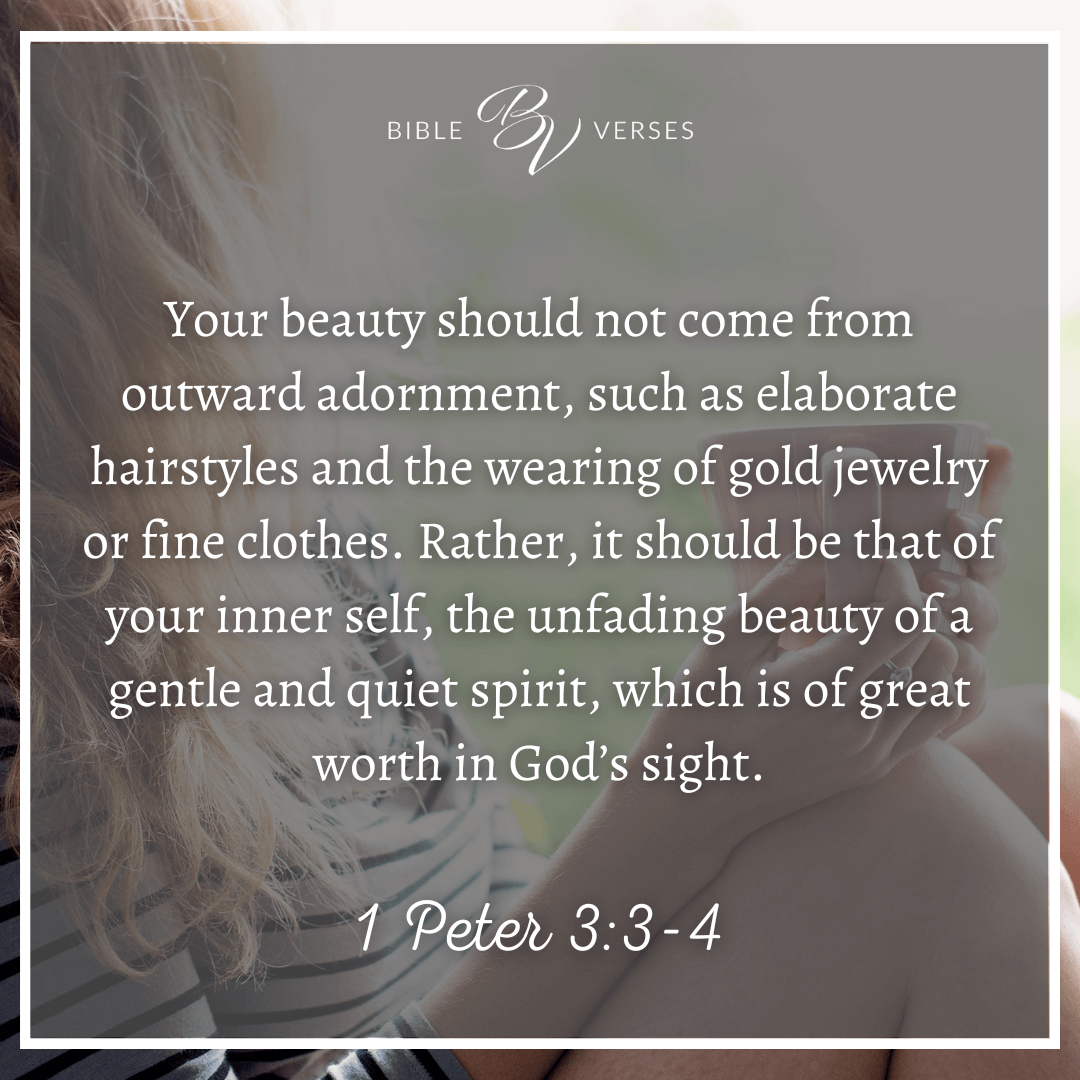
Like all the aforementioned bible verses about beauty, 1 Peter 3:3-4 emphasizes that true beauty is not derived from external adornments or physical appearances but from the qualities of the inner self.
Here, Peter is urging believers to focus on cultivating an inner beauty characterized by a gentle and quiet spirit, which reflects a deep and enduring form of beauty valued by God.



